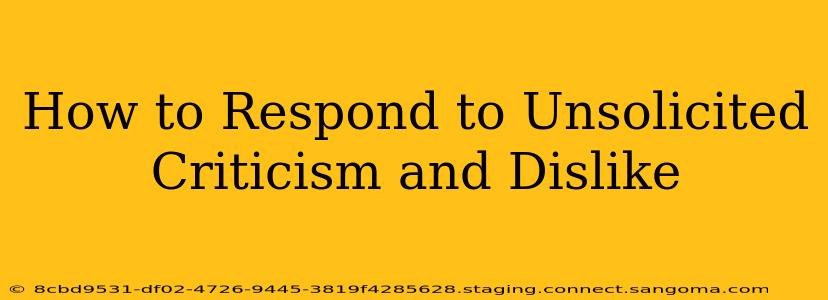Unsolicited criticism and dislike can sting, especially when it feels unfair or unwarranted. Whether it's a harsh online review, a pointed comment from a colleague, or a negative remark from a friend, navigating these situations requires grace, resilience, and a thoughtful strategy. This guide explores effective ways to respond, focusing on protecting your well-being while maintaining healthy relationships.
How Do I Deal With Unsolicited Negative Feedback?
Dealing with unsolicited negative feedback effectively depends heavily on the context and your relationship with the source. There’s no one-size-fits-all solution, but here's a breakdown of approaches:
1. Assess the Situation: Before reacting, take a deep breath and analyze the feedback. Is it constructive, even if delivered poorly? Does the person have a legitimate grievance, or is it fueled by something else (e.g., personal bias, misunderstanding)? Is the source trustworthy and their opinion valuable to you?
2. Consider Your Emotional Response: Acknowledge your feelings. It's okay to feel hurt, angry, or frustrated. Allow yourself to process these emotions before formulating a response. Avoid impulsive reactions.
3. Choose Your Response Carefully: Your approach will vary depending on the source and severity of the criticism:
-
Ignoring: Sometimes, the best response is no response. This is especially true for anonymous online trolls or people whose opinions you don't value. Engaging often fuels negativity.
-
Acknowledging (without engagement): A simple "Thank you for your feedback" can be sufficient, especially if the criticism is unproductive or overly harsh. This acknowledges their input without validating its accuracy or engaging in a debate.
-
Seeking Clarification: If the criticism is from someone you respect or whose opinion matters, you might ask for clarification. For example, "I'm interested in understanding your perspective better. Could you elaborate on what specifically didn't work for you?" This shows you're open to learning and improving.
-
Addressing Constructive Criticism: If the criticism contains valuable points, acknowledge them and discuss potential improvements. For instance, "I appreciate your feedback regarding X. I'll definitely consider that for future projects/improvements."
-
Setting Boundaries: For persistent negativity or personal attacks, setting boundaries is crucial. This might involve politely ending the conversation, limiting future interaction, or blocking the individual. Your well-being is paramount.
How Do I Respond to Hateful Comments Online?
Online hate is unfortunately common. Here's how to handle it:
-
Don't Engage: Responding often only escalates the situation. Ignoring is usually the best strategy.
-
Report and Block: Utilize the platform's reporting features to flag abusive comments and block the user to prevent further interaction.
-
Focus on the Positive: Concentrate on the supportive comments and feedback you receive. Negativity shouldn't overshadow positive interactions.
-
Consider Removing Comments: If you manage a platform (e.g., a blog or social media page), you have the right to remove hateful comments.
What if the Criticism is From a Close Friend or Family Member?
Criticism from loved ones can be particularly challenging. However, these relationships offer opportunities for open communication:
-
Schedule a Conversation: Ask for a private conversation to discuss their concerns calmly and respectfully.
-
Active Listening: Listen empathetically to their perspective without interrupting. Try to understand their point of view, even if you don't agree.
-
Express Your Feelings: Share your feelings honestly, but avoid defensiveness. Use "I" statements to express your perspective without blaming them.
-
Find Common Ground: Look for areas of agreement and build on those to find a resolution.
How Can I Learn From Criticism?
Even negative feedback can be a valuable learning experience. Focus on extracting constructive elements:
-
Identify Patterns: Do several people share similar criticisms? This might highlight areas needing improvement.
-
Seek External Perspectives: Ask trusted friends, mentors, or colleagues for their opinions on the feedback.
-
Focus on Growth: Use criticism as an opportunity for self-reflection and growth. Don't let negativity define you; use it to improve and become better.
Remember, your emotional well-being is crucial. Prioritize self-care and seek support from trusted individuals when dealing with unsolicited criticism and dislike. By choosing your responses thoughtfully, you can navigate these challenging situations with grace and resilience.

